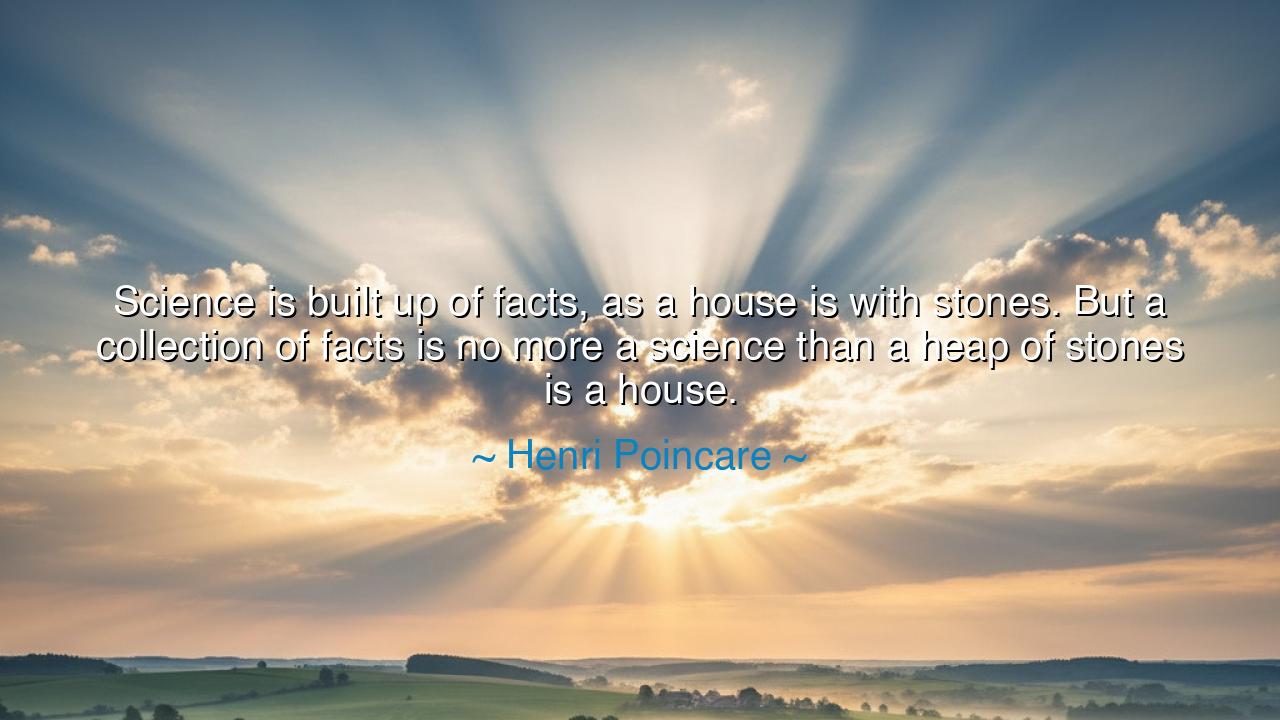
Science is built up of facts, as a house is with stones. But a
Science is built up of facts, as a house is with stones. But a collection of facts is no more a science than a heap of stones is a house.






Hear, O children of the future, the profound wisdom of Henri Poincaré, who spoke with clarity about the true nature of science: "Science is built up of facts, as a house is with stones. But a collection of facts is no more a science than a heap of stones is a house." In these words, Poincaré reminds us that while facts are the building blocks of science, they are not science in and of themselves. Just as a house is not merely a pile of stones, but a structure carefully constructed with intention and design, so too is science not merely the accumulation of facts, but the art of weaving those facts into a coherent understanding of the world. Science, at its core, is about finding meaning and order within the vastness of information we gather from the world around us.
In the ancient world, the great thinkers did not simply seek facts; they sought to understand the principles that connected those facts. Aristotle, for example, did not merely observe the world around him; he sought to find the causes behind natural phenomena. His work in biology and metaphysics was not about cataloging facts alone, but about building a system of understanding—a system in which facts were connected by logic, reason, and principles. Poincaré’s metaphor echoes this ancient pursuit, for he too is telling us that facts, by themselves, are meaningless unless they are part of a larger framework of understanding.
Consider the work of Isaac Newton, whose laws of motion and the theory of gravity did not simply emerge from an accumulation of observations. Newton’s genius lay in his ability to take the facts of motion, falling bodies, and celestial movements, and connect them in a unified theory that explained the forces behind them. He did not merely collect facts; he constructed a framework—a scientific house—that gave those facts meaning and showed their place within the order of the universe. Just as stones must be shaped and placed with purpose to form a house, so too must facts be organized and connected to form the structure of science.
In modern times, we see the same principle in the work of Albert Einstein. His theory of relativity did not emerge from a mere gathering of data about space and time. Rather, Einstein rearranged the facts we thought we knew about the universe into a new, profound framework that redefined reality. He showed us that the fabric of space-time was curved by gravity, a fact that changed our entire understanding of motion and force. This is the essence of science—the process of building a meaningful structure from the raw materials of observation and experimentation. Facts, alone, are mere stones, but science gives them purpose and connection.
The lesson, O children of the future, is clear: science is not just about collecting facts. It is about seeing the connections between those facts, about creating frameworks that explain the natural world. Facts alone do not make a house, nor do they make a science. It is the work of the mind, the effort of the thinker, to shape those facts into a coherent understanding, to organize them into a system that reveals the hidden patterns of nature. This process is what transforms a mere collection of facts into true science—an organized structure of knowledge that has meaning and purpose.
In your own lives, O seekers of wisdom, do not simply seek facts—but seek to connect them. When you learn something new, ask yourself: How does this piece of knowledge fit into the larger picture? What does it reveal about the world? How does it connect with what I already know? Like a builder of knowledge, shape and arrange the facts you encounter into a structure of understanding that can stand firm and guide you in your journey. Whether in science, philosophy, or any other pursuit, remember that the value of what you learn lies not in the individual pieces, but in how you weave them together.
So rise, O heirs of wisdom, and take this lesson to heart. Science, like a house, requires careful thought, planning, and design. Facts are the foundation, but it is your creativity, your insight, and your reasoning that will build the structure of knowledge. Seek not to accumulate facts without understanding, but to build with them a house of wisdom that will stand the test of time. Just as a house provides shelter and security, so will your scientific understanding provide you with a framework for navigating the complexities of the world. Build wisely, and your knowledge will not be a mere heap of stones, but a strong, lasting structure that illuminates the mysteries of the universe.






AAdministratorAdministrator
Welcome, honored guests. Please leave a comment, we will respond soon